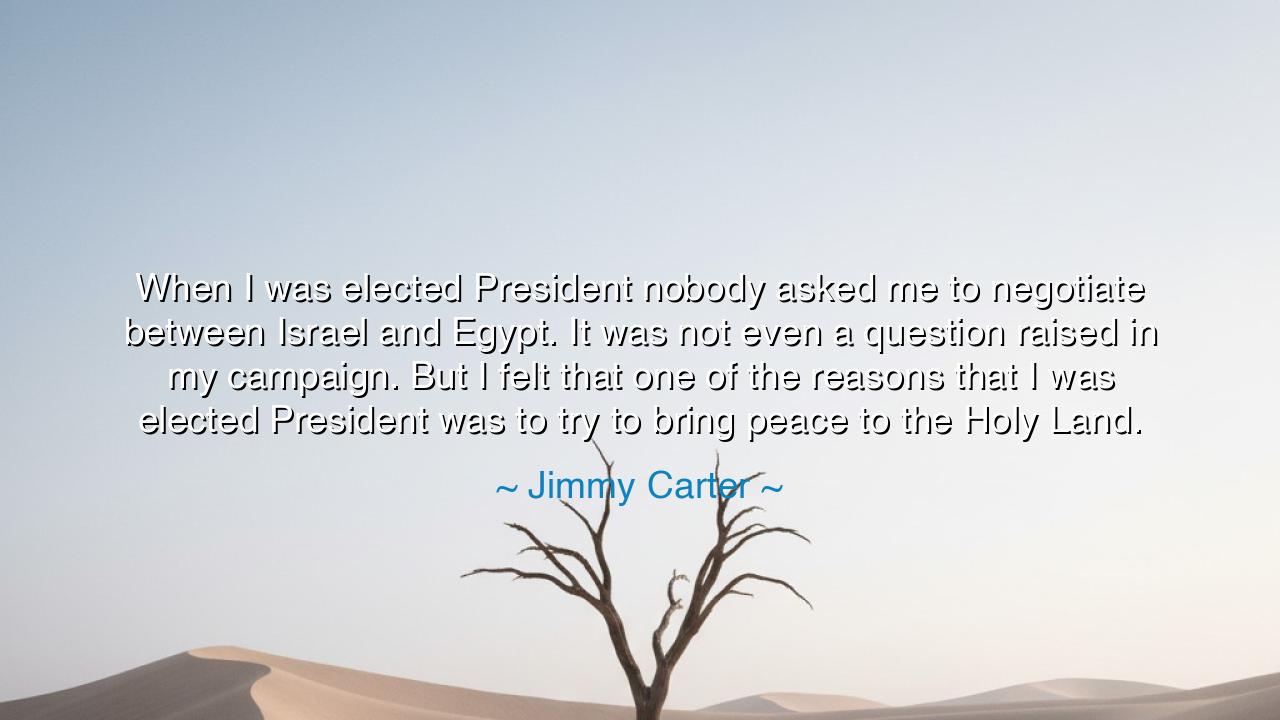
When I was elected President nobody asked me to negotiate
When I was elected President nobody asked me to negotiate between Israel and Egypt. It was not even a question raised in my campaign. But I felt that one of the reasons that I was elected President was to try to bring peace to the Holy Land.






"When I was elected President nobody asked me to negotiate between Israel and Egypt. It was not even a question raised in my campaign. But I felt that one of the reasons that I was elected President was to try to bring peace to the Holy Land." These words, spoken by Jimmy Carter, reveal the deep sense of responsibility and moral calling that led him to pursue one of the most significant diplomatic feats of the 20th century—the Camp David Accords between Israel and Egypt. Carter's reflection on his unexpected role in such a historic negotiation reveals a profound truth: sometimes, the calling for peace arises not from the expectations of others but from an inner sense of duty and a higher moral obligation. Carter understood that his role as President was not merely about fulfilling campaign promises, but about seizing the opportunity to fulfill a greater purpose: to bring peace to a region long torn by conflict and strife.
In the ancient world, the concept of leadership was inseparable from the pursuit of justice and peace. The Greeks, particularly in their philosophical traditions, believed that rulers were not simply individuals seeking power, but servants of the people tasked with the well-being and harmony of their society. Plato, in his writings, emphasized that a ruler should be a philosopher-king, someone who governs not for their own gain, but for the greater good of all. Socrates similarly taught that justice in governance was paramount, and that leaders had a sacred duty to pursue peace, especially in matters that affected the common good. Carter's decision to intervene in the Middle East, even when it was not a direct mandate from his election, mirrors this ancient understanding of leadership as a calling for justice and peace that transcends personal ambition or political expectations.
The story of Alexander the Great offers another poignant example of a ruler who was propelled by a higher calling, though his motives were often more focused on conquest than peace. Alexander, in his quest to expand the Greek empire, carried the ideals of unity and cultural exchange across vast territories. Yet, the Greek philosopher Aristotle—who was Alexander's tutor—understood that true peace could only be achieved through mutual respect and understanding, not through domination. In this context, Carter’s approach was a stark contrast to the imperial model of leadership. Instead of seeking power or territory, he sought to create peace through dialogue, humility, and compromise—an approach that elevated his leadership as one rooted in moral clarity and compassion for the suffering of others.
The Camp David Accords, brokered by Carter in 1978, stand as a testament to the transformative power of diplomacy grounded in moral conviction. In a region marked by centuries of conflict, Carter's willingness to act—despite the lack of political pressure or personal gain—demonstrated the essence of sacrifice and duty in leadership. The Accords brought together Menachem Begin of Israel and Anwar Sadat of Egypt, two leaders who were initially worlds apart, not just politically but ideologically and culturally. Yet, through Carter's patient diplomacy and unwavering commitment to peace, the two leaders reached an agreement that led to the first peace treaty between Israel and an Arab country. This peace, which has lasted for over four decades, would not have been possible without the belief that leadership is not solely about the political platform one runs on, but about answering the higher calling to create a lasting legacy of peace.
The lesson here is profound: leadership is not defined merely by what is promised during a campaign or by the expectations set by others. True leadership is defined by the willingness to step up when the opportunity for peace presents itself, even when it is not part of the immediate agenda. Carter's actions in the Middle East were driven by a belief that his role as President was more than just administrative—it was a calling to act as a steward of peace in a troubled world. This is a lesson for each of us: we are not only tasked with fulfilling the roles and responsibilities handed to us, but also with recognizing the times when we must step beyond those boundaries to fulfill a higher duty to justice, compassion, and the common good.
In our own lives, we must ask ourselves: What higher callings are we ignoring in favor of immediate concerns? Are we responding to the need for peace in our own communities, workplaces, and families? Carter’s example teaches us that sometimes the path to peace does not come from what is expected of us, but from the courage to answer the moral calls that arise unexpectedly. It teaches us that leadership is not about power, but about service and a commitment to do what is right, even when the outcome is uncertain.
Just as Carter was drawn to the cause of peace in the Holy Land, we too can find ways to be the peacemakers in the spaces where we live and work. Whether through acts of kindness, dialogue, or standing up for what is right, we can each contribute to a world that moves beyond conflict and towards reconciliation. Let Carter’s wisdom guide us: true leadership is the courage to pursue peace not when it is easy, but when it is needed most.






AAdministratorAdministrator
Welcome, honored guests. Please leave a comment, we will respond soon